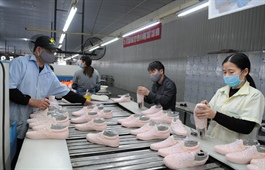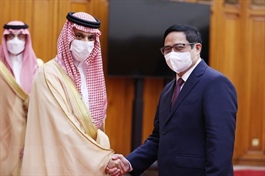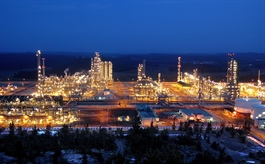Middle East a potential post-pandemic export market for Viet Nam
Middle East a potential post-pandemic export market for Viet Nam
The Middle East region is emerging as a promising post-pandemic export market for Vietnamese businesses, experts have said.

Speaking at a seminar Thursday on boosting exports to the region, Nguyen Tuan, deputy director of the HCM City Investment and Trade Promotion Centre (ITPC), said the Middle East, which comprises 16 countries and has a population of around 400 million people, is a huge market and a gateway to the European market.
Viet Nam has strong trade relations with the region, especially the Gulf Cooperation Council (GCC) with six member countries – the United Arab Emirates (UAE), Saudi Arabia, Kuwait, Bahrain, Qatar and Oman, with a total population of 65 million (in 2021).
GCC countries have high GDP per capita, with Qatar having GDP per capita of US$60,000 in 2021, followed by the UAE $41,000, Kuwait $25,000 and Saudi Arabia $22,000, he said.
Since 2003, GCC countries have agreed to apply a common import tariff of about 5 per cent throughout the region for most products.
These countries also have a huge import demand, ranging from $2-8 billion, for items such as furniture, plastic products, grains, textiles, footwear, rubber, meat, dairy products, and vegetables.
These are products that Viet Nam is able to export to meet these countries' demand, but currently isn't fulfilling that potential, Tuan said.
Statistics showed that GCC countries import about 80 per cent of food and foodstuffs worth $40 billion per year. The figure is expected to increase to $70 billion by 2035.
The Middle East is particularly a potential export market for HCM City, mostly seafood, fruits and vegetables, coffee, pepper, textiles, computers and electronic components, phone components and others.
Ambassador Extraordinary and Plenipotentiary of Viet Nam in Kuwait Ngo Toan Thang said Viet Nam’s import and export turnover to GCC countries has increased rapidly over the years, reaching $12.5 billion in 2021, up from $2.7 billion in 2012.
Viet Nam has diplomatic relations and long-term traditional cooperative relations with the GCC countries. The two sides have signed several economic, trade and scientific-technological cooperation agreements, according to Thang.
He also noted, however, that logistics, payment and a lack of information are issues that have hindered Viet Nam’s exports.
Because of the payment difficulties, both sides mostly pay via intermediary banks in other countries, which incur a high cost, he added.
Other trade barriers include the requirement for certificates of standards, quality control and labelling issued by the Gulf Standards and Metrology Organization, as well as Halal certificates for imported food and seafood products, according to Thang.
Halal certification
Nguyen Thi Ngoc Hang, marketing director of the Halal Certification Agency, said Halal certification was vital for Vietnamese businesses to export to the Middle East region where there is a large population of Muslims.
There are 2.2 billion Muslims living in 112 countries around the world, accounting for 25 per cent of the world’s population.
Muslims would not use these products unless they are identified as Halal or Haram (especially food products that are preliminarily processed or preserved).
The Halal certificate is a document that guarantees that products and services aimed at the Muslim population meet the requirements of Islamic law.
Halal certification is a process that ensures the features and quality of the products according to the rules established by the Islamic Council that allow the use of the mark Halal.
It is mainly applied to meat products and other food products such as milk, canned food and additives. Specifically, for meat products Halal certifies that the animals were slaughtered in a single cut, thoroughly bled, and their meat has not been in contact with animals slaughtered otherwise and, especially, with pork.
According to Hang, the increased demand for Halal-certified products in the past few years is attributed to the growing population of Muslims in the Middle East and the rise in disposable income to utilise these products and services.
The strong demand for Halal products is not only due to an increase of Muslims but also due to new consumption trends. There are many non-Muslims increasing spending and use of Halal food because Halal products meet the criteria of environment and food safety.
The global Halal food market is expected to continue to grow strongly. Spending on Halal food is expected to increase by 3.1 per cent from $1.4 trillion in 2020 to $1.9 trillion in 2024 and $15 trillion in 2050.

















